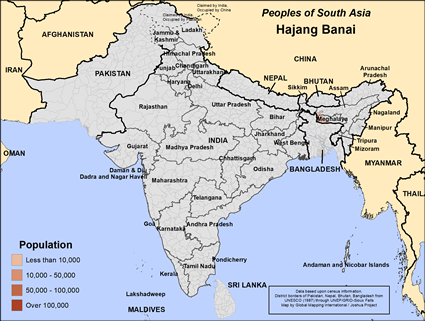Hajang Banai in India

Send Joshua Project a photo
of this people group. |

Map Source:
People Group data: Omid. Map geography: UNESCO / GMI. Map Design: Joshua Project
|
| People Name: | Hajang Banai |
| Country: | India |
| 10/40 Window: | Yes |
| Population: | 5,000 |
| World Population: | 5,000 |
| Primary Language: | Bengali |
| Primary Religion: | Hinduism |
| Christian Adherents: | 0.99 % |
| Evangelicals: | 0.00 % |
| Scripture: | Complete Bible |
| Ministry Resources: | Yes |
| Jesus Film: | Yes |
| Audio Recordings: | Yes |
| People Cluster: | South Asia Tribal - other |
| Affinity Bloc: | South Asian Peoples |
| Progress Level: |
|
Introduction / History
The Hajang are an indigenous people who live in the northeast Indian states of Megahalaya and Assam and in the country of Bangladesh. Their primary occupation is agriculture along with hunting, fishing and weaving. When Muslim armies invaded northeast India, many Hajang left their villages and migrated east to the forests and hills to try to escape the Muslims. The Hajang are classified a Scheduled Caste so they are eligible for public jobs and special university admissions. Most Hajang are illiterate or functionally illiterate.
The primary language of the Hajang is Bengali. Many also speak Assamese. Many Christian resources are available in both languages.
Where Are they Located?
The Hajang Banai live in northeast India and Bangladesh.
What Are Their Lives Like?
The main crop of the Hajang farmers is rice. They also grow potatoes, millet, lentils, wheat, and vegetables in small plots of land they own. Many Hajang also raise goats, buffalos, pigs and chickens.
The Hajang marry within their group but not within their particular clan. Families arrange most marriages with the groom's family paying a bride price to her family. The Hajang women weave blankets and make embroidered clothing, which they sell at weekly markets. Village elders settle legal issues and deal with outsiders. Most Hajang villages are without electricity and indoor plumbing.
What Are Their Beliefs?
The Hajang practice folk religion and Hinduism, the ancient religion of India. The Goddess Banai is one of the wives of Shiva who gets special devotion from the Hajang. Hindus believe that by performing rituals and good works that they will attain moksha or freedom from the endless cycle of birth, death and rebirth. The Hajang visit Hindu shrines and offer prayers, food, flowers, and incense to their gods in hopes of gaining protection and benefits. They do not have a personal or familial relationship with their gods like Christians or Jews. There are many forms of Hinduism, each with its own deities and beliefs.
The main yearly holidays of the Hajang people are Holi, the festival of colors and the start of spring, Diwali, the festival of lights, Navratri, the celebration of autumn and Rama.
What Are Their Needs?
Solar panels could help bring electricity to Hajang villages. The Hajang would benefit by the introduction of modern medicine. The Hajang need help in educating their children. Most of all, the Hajang need to hear and understand the message of Jesus Christ who alone can forgive their sins and get them right with the one, true God.
Prayer Points
Pray for a movement to Jesus to multiply among Hajang households.
Pray that God will overthrow spiritual forces of darkness opposing the spread of His Gospel among the Hajang people.
Pray for the Holy Spirit to give the Hajang people love for God's Word and a desire to spread its influence.